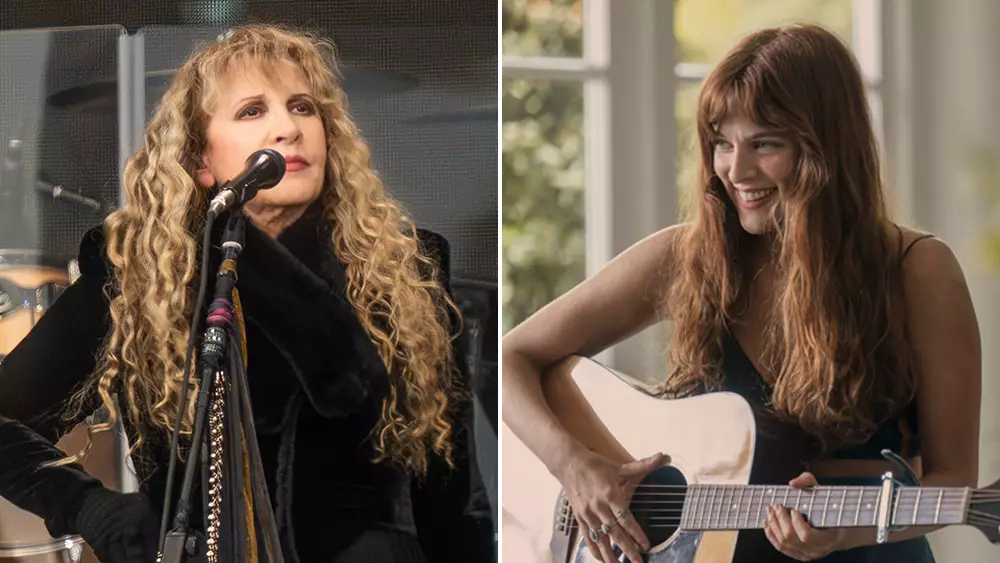Stevie Nicks, the iconic frontwoman of Fleetwood Mac, has shared her thoughts on the television adaptation of “Daisy Jones & The Six,” a Prime Video series inspired by Taylor Jenkins Reid’s novel. Initially, Nicks approached the show with skepticism, fearing that it might inaccurately represent her experiences within the tumultuous world of rock and roll. However, upon watching it during her recovery from COVID-19, she found herself pleasantly surprised and sparked with creative inspiration.
In a candid conversation with Rolling Stone, Nicks revealed her hesitation to watch “Daisy Jones & The Six,” worried that it would tarnish her memories of the past. “I didn’t even want to see it,” she stated, reflecting her trepidation towards potential misrepresentation. While battling the illness in her Los Angeles condo, she confronted her own feelings about the show, pondering if she was merely witnessing her life’s story unfold before her eyes. This introspection proved to be pivotal, as it led her to appreciate the reimagined tale and the nuances of its characters.
Nicks expressed her admiration for Riley Keough’s portrayal of Daisy, noting, “She doesn’t look like me, but her character resonates.” This acknowledgment opens up a dialogue about the representation of female rock icons in media, illustrating how the characters can embody elements of real-life figures while maintaining their unique identities. The divergence in personality between Keough’s character and Nicks signifies a broader narrative about diversity in women’s roles within the music industry.
In her reflection, Nicks praised the casting of fellow characters, especially noting Suki Waterhouse’s embodiment of Christine McVie, stating, “I thought Suki was a great Christine—in her Englishness and just the way that she dressed.” It is evident that Nicks feels a strong connection to these portrayals, recognizing the essence of her bandmates and herself within the performances. She lamented that McVie did not get to witness these resonant portrayals, emphasizing the importance of representation and the passing of legacies in the entertainment world.
Billy Dunne, portrayed by Sam Claflin, drew Nicks’ comparisons to Lindsey Buckingham, showcasing the parallels between real-life relationships that fueled Fleetwood Mac’s songwriting. Nicks admired how Claflin captured the “dark handsomeness” associated with Buckingham, successfully channeling that energy into his performance. This blurring of lines between fiction and reality underscores the emotional depth that the series strives to achieve—capturing not just historical events, but also the spirit of those who lived them.
At the conclusion of the first season, Nicks presented her ideas for a potential continuation, expressing a yearning for further exploration of the characters’ journeys. Her pitch to have Billy return after a personal tragedy to collaborate on a long-desired record showcases her passion for storytelling and musical artistry. The idea resonated with the show’s creatives, including executive producer Reese Witherspoon and Keough, indicating a shared enthusiasm for the narrative direction.
However, despite a strong desire from both Nicks and the cast to delve deeper into these characters’ lives, practical challenges seem to hinder the likelihood of a second season. The evolving careers of the cast, like Keough’s emergence as a leading film star, complicate any immediate plans for continuation. It raises pertinent questions about the feasibility of adapting life into a permanent series, particularly when the participants are evolving in their own right.
Even with uncertainties surrounding its future, “Daisy Jones & The Six” has left a lasting impression, garnering accolades at the 75th Primetime Emmys and compelling audiences with its unique storytelling. While Nicks, having witnessed the adaptation, may not have foreseen the possibility of such a representation of her life, she ultimately reflects hope. Her appreciation of the cast’s dedication suggests a profound connection to the music and the memories it evokes.
Stevie Nicks’ perspective not only highlights the impact of “Daisy Jones & The Six” on her but also serves as a testament to the shared experience of artists reflecting on their lives through creative mediums. As fans await any potential news surrounding a second installment, it remains clear that the resonance of music, memory, and storytelling continues to intertwine, capturing the hearts of both creators and audiences alike.

